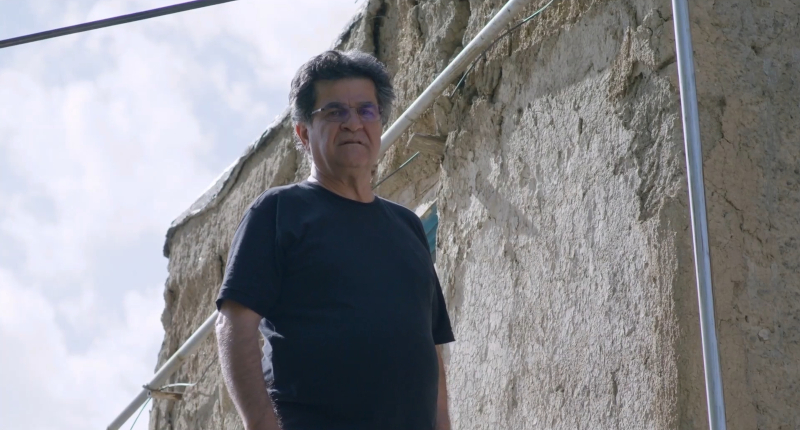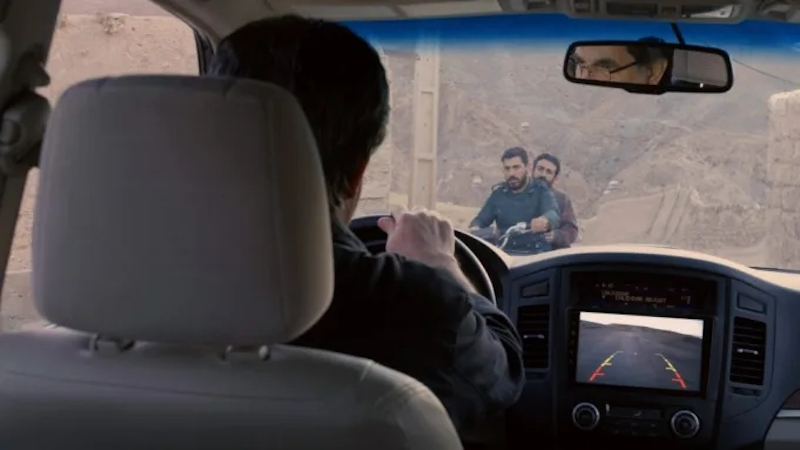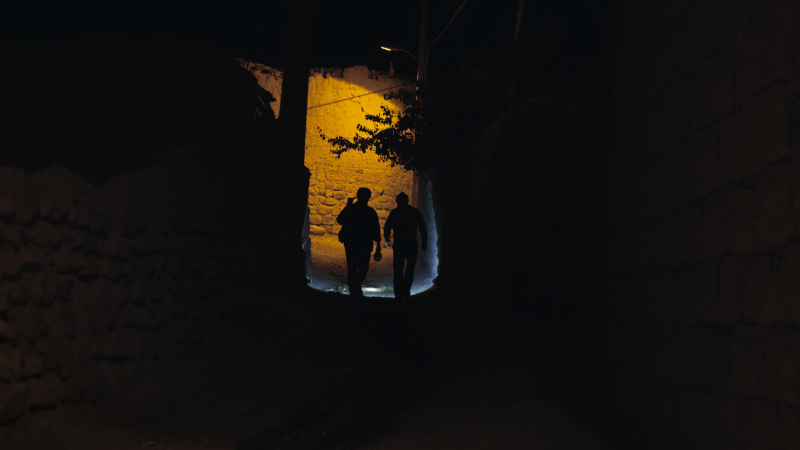Director – Jafar Panahi – 2022 – Iran – Cert. 12a – 106m
*****
An Iranian film director banned from leaving his country rents a house close to the border with Turkey, in which country he is remotely directing a film – available on the following rental streaming services from Monday, March 27th: Amazon Prime, Google Play Movies, YouTube (all £3.49), Apple TV (£4.49), BFI Player (£4.50), and Curzon (£4.99)
In a busy, metropolitian street somewhere in Iran, woman restaurateur Zara (Mina Kavani) is greeted by her partner Bakhtiar (Bakhtiar Panjei), who has secured a fake passport for her. She has only three days to use it before the passport, stolen from a tourist, is stopped. But she doesn’t want to travel outside the country without him: he is the only thing that makes her life bearable.
Then we realise we are watching a movie shoot not in Iran but in neighbouring Turkey. The director is Jafar Panahi (playing himself) and he is not allowed out of Iran, so he is renting a room in an Iranian village not far from the Turkish border and watching the shoot remotely via his computer. He’s been assured that the local internet reception is good, but it isn’t and keeps cutting out, making his job all but impossible, although his first assistant director, cast and crew are doing a good job of getting the shots in the can even when they don’t hear from him.

Failing to find a decent spot to place his phone on window sills, door ledges and on neighbouring roofs – for which purpose he borrows a ladder from Ghanbar (Vahid Mobaseri), the local man who is renting him the room – he is unable to work. Ghanbar tells him a foot-washing ceremony is taking place, a local ritual in which the two pairs of feet of a couple are washed prior to their marrying to ensure their union will be a long and happy one. So Panahi sends Ghanbar out with instructions to film everything on Panahi’s state of the art digital camera which can take video images. Ghanbar protests technical ignorance, but Panahi insists all he has to do is press play to start and pause to pause. Even so, the hapless if well-intentioned Ghanbar gets the two functions mixed up, and when he returns, among other things he’s shot a whole sequence of his feet walking and verbal conversations of people he passes, which turn out to be strangely compelling.
Hearing that there are smugglers moving goods across the border, Panahi drives out there to see for himself (with no intention of crossing the border and breaking the conditions set for him by the authorities). This minor trip, along with his presence in the village as a hot-shot film director from Tehran who must be up to something, causes concern to the authorities. There are rumours and half truths and suggestions, with locals becoming increasingly agitated about his presence in the village, but no-one will ever give him a straight answer as to what’s going on.
The subject of the betrothed couple also takes on significance as the girl is in love with someone else, a young man expelled from university after becoming involved in student protests who wants to take her across the border and escape. Panahi (or perhaps Ghanbar on his behalf) has allegedly taken a photo of the two forbidden lovers, and if this picture were to be handed over to the village elder, as proof of the couple’s actions, the matter could be sorted out. But Panahi claims he’s never taken any such photograph. Showing them all the pictures on his digital camera, which doesn’t include any that fit this description, and even handing the camera over to them, fails to convince them that no such picture exists.
Meanwhile, the story of Zara and Bakhtiar– who in the world of Panahi’s film are actors effectively playing themselves in the film within the film – and their attempts to leave Turkey takes a turn from the worse…

It is quite incredible that a film about the effect of an authoritarian government (such as those found in Iran and to a lesser extent Turkey) can be so playful and winsome in its execution, yet Panahi’s film is suffused with a love of being alive, of meeting ordinary people, spending time with them and talking about their everyday concerns, and a love of his country no matter how politically screwed up it might be and the cost to him personally. You’re obviously watching a fictionalised version of the director, while the other characters are characters within the film rather than subjects in a documentary, yet the film constantly pushes at the boundaries, many of which appear at first glance to be completely innocuous, of what a film-maker living under a repressive regime such as Iran at the present time is allowed to do or show. Not only that, but the degree of technical competence and adept storytelling ability on display here is exemplary.
It’s called No Bears because at one point, a local tries to stop Panahi going for a walk at night in a particular direction on the grounds that it’s dangerous because of the bears. Later, the same man explains that this is just a fake story to stop people going out along this path at night: in reality, there are no bears there. Clearly there are bears, just not the wild animals about which Panahi is warned.
Back in the real world, since making this film, Jafar Panahi has been imprisoned for six years by the Iranian authorities who would appear not to like having artists they cannot completely control, even artists who appear patriotic and have nothing but the best interests of their country at heart.
You might think the film is a boring political diatribe. But it isn’t – it’s deeply intelligent and hugely entertaining, as much so, frankly, as any other movie you’ll see this year. (Panahi’s other films include the hilarious and insightful Offside (2006), about female football fans being refused entry to football matches on grounds of their gender.) His son Panah is the director of the recent arthouse success Hit The Road (2021). No-one is saying Jafar Panahi has been imprisoned because of No Bears specifically, it appears more to do with his refusal to cowtow to the Iranian authorities and tow the line generally. This is possibly the most vital and life-affirming film you’ll see this year.
Read my alternate review for Reform magazine here.
No Bears is available on the following rental streaming services from Monday, March 27th: Amazon Prime, Google Play Movies, YouTube (all £3.49), Apple TV (£4.49), BFI Player (£4.50), and Curzon (£4.99).
It was previously out in cinemas in the UK on Friday, November 11th following its screening as a late addition to the BFI London Film Festival 2022.
#freejafarpanahi
Trailer:
LFF 2022 Trailer:
